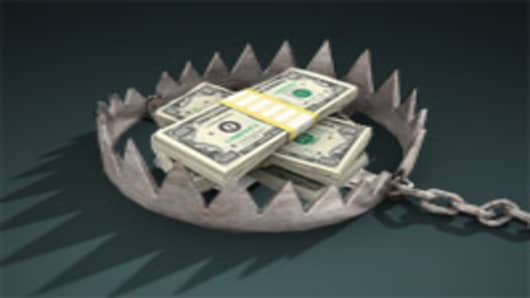Thank God Thanksgiving is around the corner. Traders are exhausted trying to figure out every iteration of how to play the "fiscal cliff." So they've given up with being creative. They're just depressed now.
Here's one comment from a trader just back from an investment conference: "Stock, [mutual fund], and [exchange-traded fund] sellers are everywhere, as most investors expect to pay more cap gains on Jan. 1 then today. Sell your winners now is the mantra!"
And this from an ETF trader: "Been wrestling with it, but keep coming back to 'short everything.' In all seriousness: gold and commodities. USCI. DBC."
The one beneficiary from this mess seems to be ETFs. They are simply more tax efficient, and in this environment, that matters.
For more on why ETFs are more tax efficient than mutual funds, see my "Trader Talk" story from last week.
Ben Johnson at Morningstar noted to me that there has been notably increased volume in some of the biggest ETFs since the election: S&P 500 SPDR volume up 42 percent compared to the trailing 3 month average prior to the election, S&P Financials up 37 percent.
There's also been a significant increase in trading in the iShares FTSE China 25 Index Fund, the main ETF for trading China shares, which, Ben says, "coincides with the leadership transition underway in China."
One big beneficiary of the election and the fiscal cliff: volatility ETFs. Trading in the Barclays Short-Term VIX up 99 percent. Traders are betting on an increase in volatility, but it's not happening: the cash Volatility Index has remained stubbornly below 20. Traders are losing money betting on volatility.
So why is volatility so low? With markets down since the election, how come traders aren't freaking out and buying protection? One explanation is that the holidays are coming up. There are more days off in the next month, and since the VIX calculates the odds of the markets moving when they are open, the VIX is rightly assuming less volatility.
That may be part of it, but it's not completely satisfying. The simplest answer: traders are selling puts. They are selling volatility. A lot of money hedged, particularly when the S&P 500 index was above 1,400. Now, as the market has been dropping, they are unwinding those hedges. They are selling those puts they had bought because they are in the money.
Elsewhere:
1) World Gold Council released its report on third-quarter gold demand: Gold sales at 1,084.6 tons, down 11 percent from third-quarter 2011 "due to the challenging global economic climate."
Key trends:
a) gold sales recovered somewhat in India, with sales up 8 percent;
b) sales in China were down 8 percent due to the slower economy: "This was particularly noticeable among the middle classes, whose purchases of 18-carat gold jewelry were among the worst casualties";
c) central bank purchases were down 31 percent; and
d) purchases of gold using ETFs increased 56 percent (!), apparently due to concerns about more quantitative easing and the effect on inflation.
2) You're what? Ross Stores reported earnings and revenue in line with expectations, but buried in the release is this neologism from CEO Michael Balmuth: "We are also anniversarying the robust 7 percent increase in same-store sales from last year's fourth quarter." Anniversarying? That's not a word that belongs in a discount chain release! Or anyone else's.
—By CNBC's Bob Pisani
_____________________________
Bookmark CNBC Data Pages:
_____________________________
Want updates whenever a Trader Talk blog is filed? Follow me on Twitter: twitter.com/BobPisani.
Questions? Comments? tradertalk@cnbc.com



